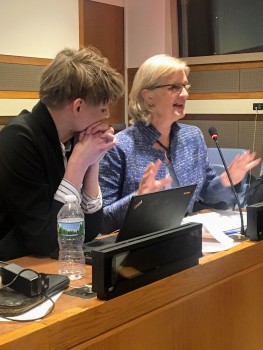
Protecting Bodies – Protecting Rights – Faith Communities and Leaders Enabling Sexual and Reproductive Health Rights
ACT Alliance together with World Council of Churches, UNFPA and the government of Norway co-hosted this official Side Event of the United Nations 50th Commission on Population and Development (CPD 50) in New York on 4 April 2017.
After months of planning the day arrived. To our great joy – the room filled to capacity and people continued to come. Well over 120 in total. Fortunately there was a good representation of youth in the crowd – so those who didn’t find seats, sat on the floor.
Here are some of my reflections on the event and its implications for ACT:
On matters of gender and sexuality, faith leaders and faith communities are deeply influential in shaping values, attitudes and practices. It is important that we use our faith resources wisely and in ways that affirm life, human dignity and human rights. We recognize that Sexual and Reproductive Health Rights encompasses issues that are highly sensitive for faith communities and that teachings and practices vary within and between religions.
A great success of this Side Event therefore was that we managed to gather different faith perspectives: Catholic, Protestant, Muslim and Jewish; theologians, health workers and development practitioners. They helped us to understand some of our blind spots – and also offered very concrete examples of how faith leaders and communities can and do enable sexual and reproductive rights in many different contexts.
Here are some of the learnings and action points that emerged for moving forward:
- • Creating and nurturing spaces for dialogue and knowledge sharing are essential. Majority votes generally don’t work in faith settings and there is much to be gained from consensus –building. As faith actors, we need to stop asking each other “what” we believe and start asking “why” we believe. Engaging in Sexual and Reproductive Health Rights means grappling with difficult ethical dilemmas and sometimes choosing the greater good over lesser evils. Moral discernment, critical thinking and willingness to listen to each other are key.
- • It is important to invest in theological reflection. Sometimes we need to go back to the scriptures and not just accept existing interpretations and practices. These practices are often intertwined with cultural practices that may be harmful and out-dated and have nothing to do with what is actually written in scripture.
- • Faith leaders and communities need to embrace human rights agendas as their own. Human dignity is the basis for human rights. Human dignity is central to our faiths.
- • A Christian perspective: Faith based organizations with an agenda for SRHR need to be proactively engaging in moral discernment and not remain comfortable. We need to call out faith leaders when they act in ways that put youth – and in particular girls at risk.
- • A Muslim perspective – Our faith leaders need to be in dialogue with their members and constituencies to better understand their issues and needs.
- • A Jewish perspective – We need to be careful of building fences around laws – and look deeper into the scriptures and how these apply to people’s lives.
- • Language matters. The words used to name programs, education resources, and other aspects of the work can have a variety of meanings in different cultural contexts.
- • Family planning can be a good entry point for cooperation between FBOs and donors. It is an area of work where it is possible to get some consensus among faith actors on programmatic interventions. A specific recommendation for the future is for donors to earmark funds for FBO family planning initiatives.
ACT Alliance has continued the pilgrimage for gender justice from the Commission on the Status of Women in March to Commission on Population and Development in April. We need to keep the good momentum – and look to continuing the pilgrimage at the UN General Assembly and beyond. Faith leaders and communities are essential to enabling SRHR. And SRHR is essential for achieving the Sustainable Development Goals. SDG 3 (Good Health and Wellbeing) and SDG 5 (Gender Equality) are the first of the 17 SDGs that are up for review – and ACT should be ready to show we are making a difference.
—–
Gwenneth Berge is ACT’s Senior Advisor on Religion and Development